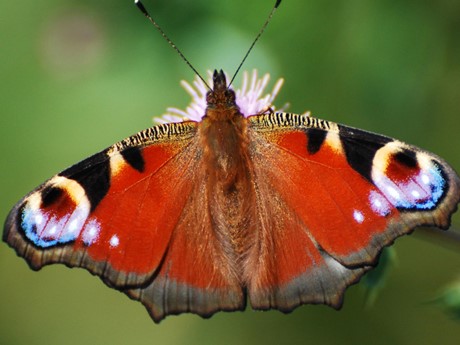Tritrophic phenological match-mismatch in space and time
Burgess et al. 2018, 21/06/2018
Scientists have been studying the effect of earlier springs on feeding relationships in deciduous forests. Concerned about the impact of rising temperatures linked to climate change, they studied the links between oak first leaf, caterpillar activity and bird nesting. The findings have been published in the respected scientific journal, Nature Ecology and Evolution, entitled Tritrophic phenological match-mismatch in space and time.
Collecting the data
Led by researchers from RSPB and the universities of Exeter and Edinburgh, the research team also included the universities of Durham, Sheffield, Glasgow, Oxford, Stirling and Cardiff. They used data from citizen science projects - projects which involve volunteers in the scientific process, in this case collecting environmental data.
This data included records from Nature's Calendar. For this research, 10,073 records of oak tree first leafing dates from 1998 to 2016 were used.
The timing of egg laying by blue tits, great tits and pied flycatchers were recorded by the British Trust for Ornithology's Nest Record Scheme, which has been running since 1939. The study used ‘first egg dates’ (FED) from 1960 to 2016.
Caterpillar abundance was inferred by the researchers who used traps to collect their droppings beneath oak trees between 2008 and 2016.
The impact of earlier springs
In deciduous forests there is a short window of opportunity in spring when caterpillars are abundant. Some bird species time their breeding so that their chicks benefit from this influx of food.
Although spring this year may have bucked the trend, on average spring is now arriving 11 days earlier than it was in the 19th century. Oak trees leaf earlier in warmer springs, which correlates with an earlier peak in the caterpillar abundance too; oak and caterpillars have a similar sensitivity to temperature changes. The birds need to breed earlier to reap the rewards of the ephemeral caterpillar crop.
Main findings
The researchers found that the warmer springs create a ‘mismatch’, where hungry chicks hatch too late to feast on abundant caterpillars.
The earlier that spring arrives, the harder it is for birds to adjust the timing of their breeding to match the peak in caterpillars.
Pied flycatchers experienced the greatest mismatch as they are migratory birds - not being in the UK over winter means they are less able to respond to changes in our local weather.
In the future, spring is expected to continue getting warmer and earlier due to climate change. Hatching of these forest birds will be ‘increasingly mismatched’ with peaks in caterpillar numbers.
